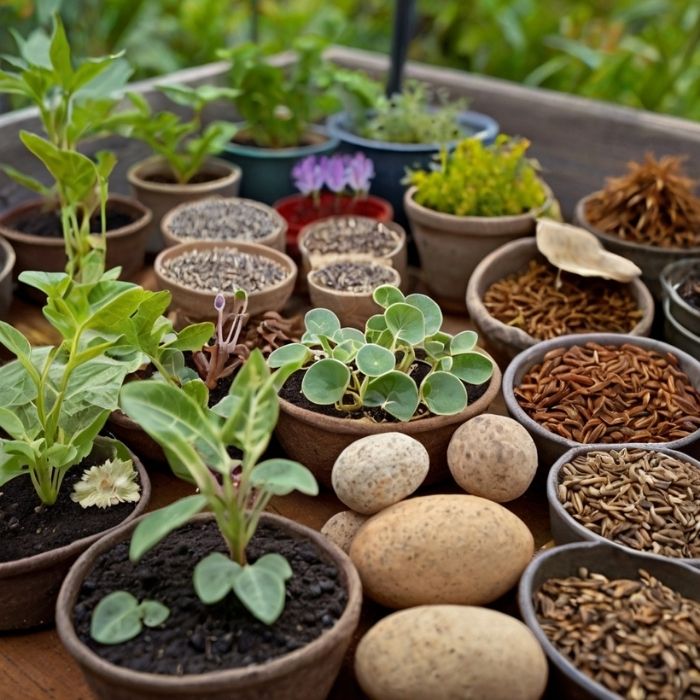Seed Types: A Comprehensive Guide to Choosing the Right Seeds for Your Garden
When it comes to gardening, the foundation of a thriving garden lies in the seeds you choose. Whether you’re a seasoned gardener or a beginner, understanding the different types of seeds available can make a significant difference in your gardening success. From heirloom seeds to hybrid varieties, each seed type has its unique characteristics, benefits, and challenges. In this guide, we’ll explore the various seed types, their pros and cons, and how to select the best seeds for your garden.
1. Heirloom Seeds: Preserving Tradition
Heirloom seeds are the gold standard for gardeners who value tradition and flavor. These seeds have been passed down through generations, often for 50 years or more, and are open-pollinated, meaning insects, wind, or birds naturally pollinate them.
Benefits of Heirloom Seeds:
- Flavor and Variety: Heirloom plants offer exceptional taste and unique varieties, such as colorful tomatoes, purple carrots, or striped beans.
- Seed Saving: Since heirlooms are open-pollinated, you can save their seeds year after year, ensuring a sustainable garden.
- Genetic Diversity: Heirlooms contribute to biodiversity by preserving rare and unique plant varieties.
Challenges:
- Less Disease Resistance: Heirlooms may lack the disease resistance of modern hybrids.
- Lower Yields: They often produce smaller harvests compared to hybrid seeds.
Best For: Gardeners who prioritize flavor, sustainability, and preserving plant heritage.
2. Hybrid Seeds: The Best of Both Worlds
Hybrid seeds result from cross-pollinating two different plant varieties to produce a new plant with desirable traits. Breeders often create these seeds for specific characteristics like disease resistance, higher yields, or uniformity.
Benefits of Hybrid Seeds:
- Disease Resistance: Hybrids often resist common diseases, making them a reliable choice for gardeners.
- Higher Yields: They tend to produce more fruits or vegetables per plant.
- Uniformity: Hybrid plants grow consistently in size and shape, which is ideal for commercial growers.
Challenges:
- Seed Saving: Seeds from hybrid plants won’t produce the same plant if saved, so you’ll need to buy new seeds each year.
- Flavor Trade-Off: While hybrids are reliable, they may not match the flavor of heirloom varieties.
Best For: Gardeners looking for high yields, disease resistance, and consistent performance.
3. Open-Pollinated Seeds: Nature’s Way
Open-pollinated seeds are pollinated naturally by wind, insects, or other natural mechanisms. Unlike hybrids, these seeds will produce plants that are true to the parent plant, making them a favorite among seed savers.
Benefits of Open-Pollinated Seeds:
- Seed Saving: Like heirlooms, open-pollinated seeds can be saved and replanted year after year.
- Adaptability: Over time, these plants adapt to local growing conditions, becoming hardier and more resilient.
- Biodiversity: They contribute to genetic diversity, which is crucial for a healthy ecosystem.
Challenges:
- Variability: There can be some variation in plant traits, which may not appeal to gardeners seeking uniformity.
- Disease Susceptibility: They may not have the same disease resistance as hybrids.
Best For: Gardeners who want to save seeds and value genetic diversity.
4. Organic Seeds: Growing Naturally
Organic seeds come from plants grown without synthetic pesticides, herbicides, or fertilizers. These seeds meet strict organic certification standards.
Benefits of Organic Seeds:
- Chemical-Free: Ideal for gardeners who want to avoid synthetic chemicals and promote a healthier environment.
- Sustainability: Organic farming practices benefit the soil and ecosystem.
- Non-GMO: Organic seeds are never genetically modified.
Challenges:
- Cost: Organic seeds can be more expensive due to the rigorous certification process.
- Availability: They may not be as widely available as conventional seeds.
Best For: Eco-conscious gardeners who prioritize organic gardening practices.
5. GMO Seeds: The Science of Agriculture
Genetically Modified Organism (GMO) seeds result from altering a plant’s DNA in a lab to introduce specific traits, such as pest resistance or drought tolerance. These seeds are highly controversial and are primarily used in large-scale agriculture.
Benefits of GMO Seeds:
- Pest and Disease Resistance: GMO plants often resist pests and diseases, reducing the need for chemical treatments.
- Higher Yields: They can produce more food per acre, which is crucial for feeding a growing global population.
- Environmental Adaptability: Some GMO seeds thrive in challenging conditions, such as drought or poor soil.
Challenges:
- Ethical Concerns: Many gardeners and consumers worry about the long-term impact of GMOs on health and the environment.
- Regulation: GMO seeds are heavily regulated and not typically available to home gardeners.
Best For: Large-scale farmers and commercial growers focused on maximizing productivity.
6. Pelleted Seeds: Precision Planting
Pelleted seeds have a coating of inert material to make them larger and easier to handle. This coating dissolves once the seed is planted, allowing it to germinate naturally.
Benefits of Pelleted Seeds:
- Ease of Planting: The larger size makes them easier to handle and space correctly, especially for small seeds like carrots or lettuce.
- Reduced Waste: Precision planting means fewer seeds are wasted.
- Uniform Germination: The coating can help ensure more consistent germination.
Challenges:
- Cost: Pelleted seeds are often more expensive than regular seeds.
- Limited Varieties: Not all seed types are available in pelleted form.
Best For: Gardeners who want to simplify planting and reduce seed waste.
7. Treated Seeds: Protection from the Start
Treated seeds have a coating of fungicides or insecticides to protect them from pests and diseases during germination and early growth.
Benefits of Treated Seeds:
- Disease Prevention: The treatment helps protect young plants from soil-borne diseases.
- Pest Resistance: Insects are less likely to damage treated seeds.
- Higher Germination Rates: The protective coating can improve germination success.
Challenges:
- Chemical Use: The use of fungicides and insecticides may not align with organic gardening practices.
- Environmental Impact: There are concerns about the impact of these chemicals on beneficial insects and soil health.
Best For: Gardeners dealing with persistent pest or disease problems.
How to Choose the Right Seeds for Your Garden
Selecting the right seeds depends on your gardening goals, climate, and personal preferences. Here are some tips to help you decide:
- Consider Your Climate: Choose seeds that suit your growing zone and local weather conditions.
- Think About Your Goals: Are you growing for flavor, yield, or sustainability? Your priorities will influence your seed choice.
- Check Seed Quality: Always buy seeds from reputable suppliers to ensure they are fresh and viable.
- Experiment: Don’t be afraid to try different seed types to see what works best in your garden.
Final Thoughts
Understanding the different seed types is the first step toward creating a thriving garden. Whether you choose heirloom seeds for their rich history, hybrid seeds for their reliability, or organic seeds for their eco-friendly benefits, each type has something unique to offer. By selecting the right seeds for your needs, you’ll be well on your way to enjoying a bountiful and beautiful garden.
Happy gardening!

